Why Donald Trump Beats Jeb Bush: The Personal Electability Index
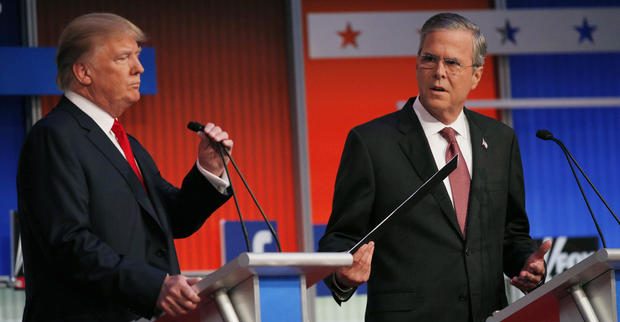
Republican 2016 presidential candidates, businessman Donald Trump (L) and former Florida Governor Jeb Bush, take their places at their podiums before the start of the first official Republican presidential candidates debate of the 2016 U.S. presidential campaign in Cleveland, Ohio, August 6, 2015. Photo credit: Brian Snyder/Reuters
August 23, 2015
Research conducted at the Unit for the Study of Personality in Politics under the direction of Aubrey Immelman, Ph.D., offers a political-psychological explanation for Donald Trump’s personal appeal as a candidate and Jeb Bush’s inability to consolidate his erstwhile front-runner status in the 2016 U.S. presidential election Republican primary.
The following link is a summary of the major findings of the study, as published in an opinion column in the St. Cloud Times.
Why Bush Gets Trumped in the Polls
Commentary
 Jeb Bush’s extraordinarily low rating of -3 on the Personal Electability Index, which has accurately predicted the outcome of every presidential election since 1996), ranks near the bottom among presidential candidates I’ve studied in the past five presidential election cycles.
Jeb Bush’s extraordinarily low rating of -3 on the Personal Electability Index, which has accurately predicted the outcome of every presidential election since 1996), ranks near the bottom among presidential candidates I’ve studied in the past five presidential election cycles.
Compared with recent presidential candidates that most closely resemble Bush, Romney’s PEI score is marginally worse than Mitt Romney’s lackluster score of 6, though considerably better than Al Gore’s record-low score of -17.
Donald Trump, in contrast, obtained a higher PEI score than any presidential candidate since I started employing the heuristic in 1996. Of all major-party nominees since 1996, Trump most closely resembles Bill Clinton (the previous PEI leader with a score of 37), though Trump is considerably more dominant than Clinton.
Caveat: Trump’s inordinately high PEI score of 62 in large part is accounted for by extreme MIDC scale elevations on on scale 1A (which measures dominance) and scale 2 (a measure of narcissism). In my opinion, a PEI correction factor may need to be instituted for scale elevations of that order. (The PEI already contains a correction factor for scale 6, where a candidate is not penalized for the first four points of MIDC scale elevation on conscientiousness.)
Following are the PEI calculations for Jeb Bush and Donald Trump.
Jeb Bush: PEI = (–)3
| Scale: | 1A | 1B | 2 | 3 | 4 | 5A | 5B | 6 | 7 | 8 |
| Score: | 9 | 3 | 8 | 1 | 5 | 1 | 5 | 15 | 4 | 10 |
Scale: 1A = 9; 2 = 8; 3 = 1; 6 = 15; 8 = 10
[Extraversion (scale 3) = 1] + [Narcissism (scale 2) = 8] + [Dominance (scale 1A) = 9] – [Introversion (scale 8) = 10] – [Conscientiousness (scale 6) = (15 – 4) = 11] = 18 – 21 = (-)3
Donald Trump: PEI = 62
| Scale: | 1A | 1B | 2 | 3 | 4 | 5A | 5B | 6 | 7 | 8 |
| Score: | 19 | 11 | 24 | 19 | 1 | 0 | 6 | 2 | 1 | 0 |
Scale: 1A = 19; 2 = 24; 3 =19; 6 = 2; 8 = 0
[Extraversion (scale 3) = 19] + [Narcissism (scale 2) = 24] + [Dominance (scale 1A) = 19] – [Introversion (scale 8) = 0] – [Conscientiousness (scale 6) = (2 – 2) = 0] = 62 – 0 = 62
Dysfunctionality adjusted
[Extraversion (scale 3) = 15] + [Narcissism (scale 2) = 15] + [Dominance (scale 1A) = 15] – [Introversion (scale 8) = 0] – [Conscientiousness (scale 6) = (2 – 2) = 0] = 45 – 0 = 45
Updates: Related interest
Real Clear Politics Poll Average – July-August 2015
On June 15, Jeb Bush led all Republican contenders with 10.8% in the Real Clear Politics poll average, with Donald Trump in 9th place at 3.6%.
A month later, on July 16, Trump (15%), had drawn even with front-runner Bush (15.5%).
By July 20, Trump (16.8%) had overtaken Bush (14.6%) for the lead.
By the end of the summer, on Aug. 31, Trump (25.7%) had jumped to a comfortable lead over Bush (9.7%), who had dropped to third place behind Ben Carson.
Pollsters Dumbfounded by Trump
By Ben Kamisar
![]()
August 27, 2015
Excerpt
Polling experts agree on one thing when it comes to Donald Trump’s presidential run: They’ve never seen anything like it.
The billionaire businessman’s dominance of the Republican presidential race is forcing experienced political hands to question whether everything they know about winning the White House is wrong.
The shocks have come in quick succession, with Trump first rocketing to the top of national polls, and then taking double-digit leads in the early voting states of Iowa, New Hampshire and South Carolina.
In another act of political magic, Trump managed to flip his favorability rating from negative to positive in one poll during the span of a month — a feat that Monmouth University’s Patrick Murray called “astounding.”
“That defies any rule in presidential politics that I’ve ever seen,” Murray, the director Monmouth’s Polling Institute, told The Hill.
Trump’s favorability rose from 20 percent to 52 percent among Republican voters between July and August, Monmouth found. … Read the full report
5 Reasons Bush Isn’t Freaking Out About Trump
By Marc Caputo and Anna Palmer
![]()
August 21, 2015
9/16/2015 Update
Nate Silver: Trump Has About 5% Chance of Winning
[GOP nomination]
![]()
September 15, 2015
Statistician and writer Nate Silver joins Anderson Cooper to share his evaluation of the Trump campaign.
ANDERSON COOPER, CNN: Our next guest made his reputation by picking the right polling data … to make much more accurate predictions, extremely accurate predictions. Nate Silver,FiveThirtyEight.com joins us tonight to talk about what the numbers can and can’t say right now about the state of the race.
So it’s really fascinating because you put the chance of Donald Trump or Ben Carson actually getting the GOP nomination and put it around 5 percent.
NATE SILVER, FIVETHIRTYEIGHT: Maybe about 5 percent each, somewhere around there.
COOPER: Why so low?
SILVER: So there are couple things to think about. One is that if you look back at history, you’ve never seen candidates like Donald Trump certainly or Ben Carson win a party nomination. And secondly, if you look at the polling, a lot of times a candidate who is leading the polls now mid-September didn’t win the nomination, didn’t even come close. I think … people forget that polls five months before Iowa historically have told you very, very little. … Full report
10/22/2015 Update
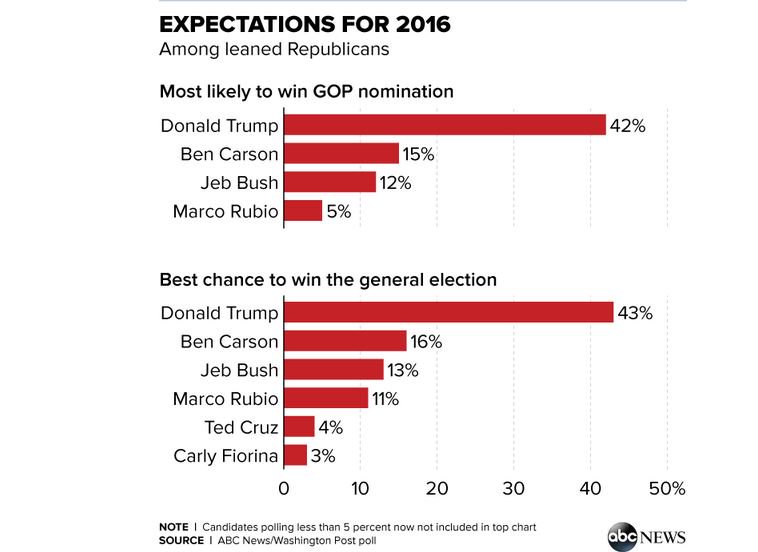
10/31/2015 Update
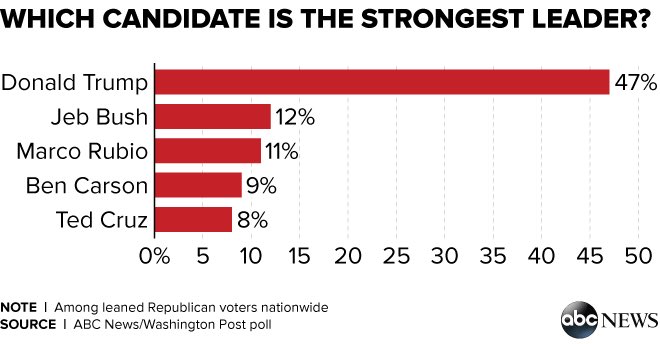
2/12/2016 Update
Here Are Some of the Absolute Worst Predictions of the 2016 Race So Far
![]() By Katherine Krueger
By Katherine Krueger
Talking Points Memo
February 10, 2016
2/16/2016 Update
Donald Trump Will Be G.O.P. Nominee, Students’ Mock Convention Says
By Nicholas Fandos

February 13, 2016
3/2/2016 Update
CSB/SJU Professor Predicts Trump Would Beat Clinton
By Kirsti Marohn
St. Cloud Times
March 1, 2016 (4:35 p.m. CST)
Related reports on this site
Projecting the Winner of the 2016 Presidential Election: The Personal Electability Index (Feb. 29, 2016)
The Personality Profile of 2016 Republican Presidential Candidate Donald Trump (Aug. 9, 2015)
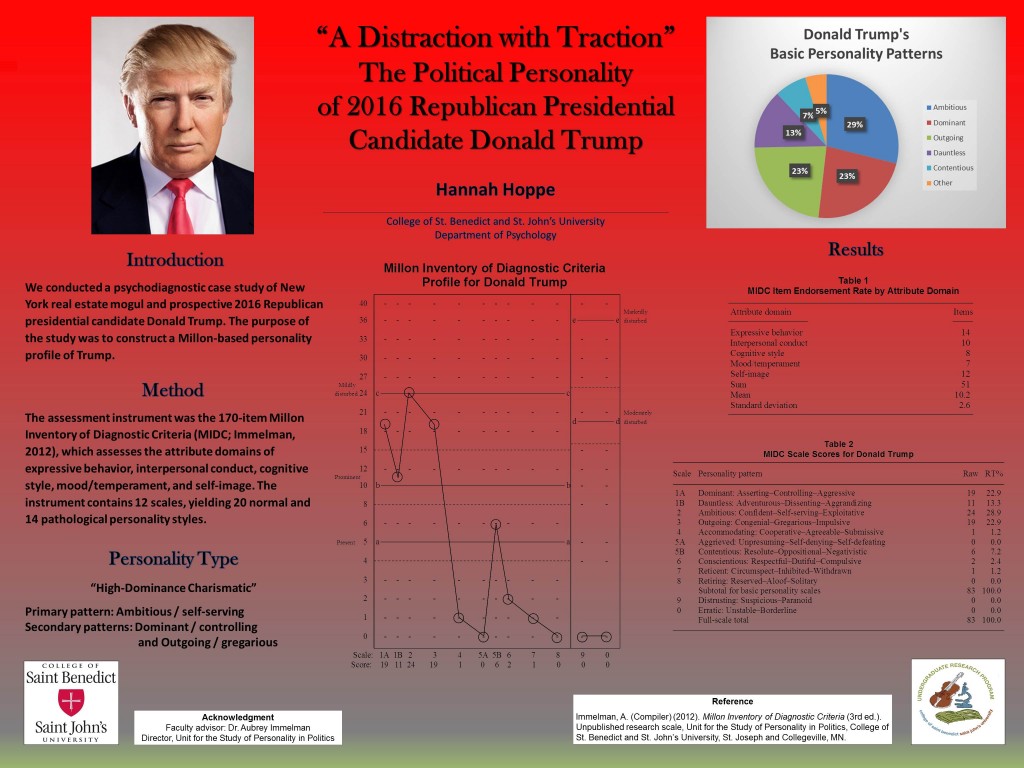
Click on image for larger view
Excerpt: A psychological analysis of real estate developer and television celebrity Donald Trump — a contender for the Republican nomination in the 2016 presidential election — by Hannah Hoppe and Aubrey Immelman, Ph.D., at the Unit for the Study of Personality in Politics, revealed that Trump’s predominant personality pattern is Ambitious / self-serving (a measure of narcissism) with secondary features of the Dominant / controlling and Outgoing / gregarious patterns. In summary, Trump’s personality composite can be characterized as ahigh-dominance charismatic.
The Personality Profile of 2016 Republican Presidential Candidate Jeb Bush (Aug. 2, 2015)
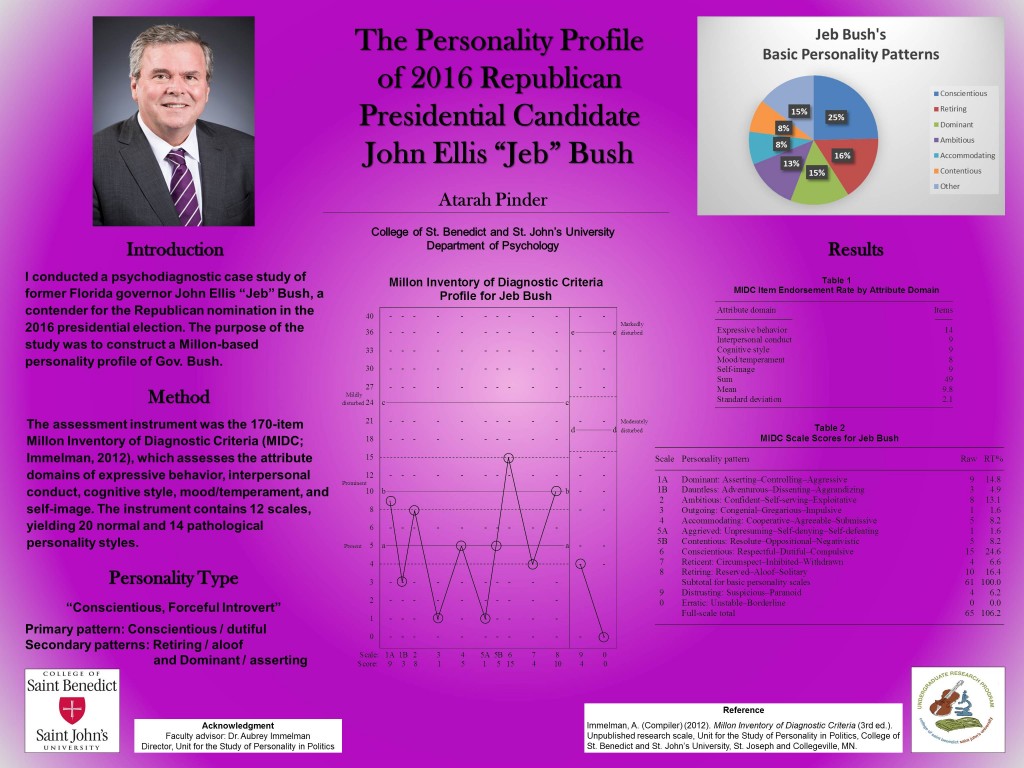
Click on image for larger view
Excerpt: A psychological analysis of former Florida governor Jeb Bush — a contender for the Republican nomination in the 2016 presidential election — by Atarah Pinder and Aubrey Immelman, Ph.D., at the Unit for the Study of Personality in Politics, revealed that Bush’s predominant personality pattern is Conscientious / dutiful and Retiring / aloof, with secondary Dominant / asserting features. In summary, Bush’s personality composite can be characterized as a conscientious, forceful introvert.
Why Mitt Romney Won’t Be President — In Theory (Oct. 29, 2012)

Aubrey Immelman and Andrew Obritsch in Chicago at the annual scientific meeting of the International Society of Political Psychology to present their research on Barack Obama and Mitt Romney, July 2012.
Excerpt: A heuristic model developed at the Unit for the Study of Personality in Politics to predict the winner of the presidential election prior to Super Tuesday indicates that Democratic incumbent President Barack Obama will defeat Republican challenger Gov. Mitt Romney in the November 6, 2012 U.S. presidential election.
Personality Matters: Mitt Romney Has Al Gore Problem
(Jan. 16, 2012)
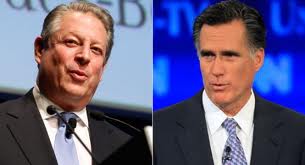
Photo composite: The Moderate Voice
Excerpt: Dana Milbank’s Washington Post opinion column outlining Mitt Romney’s personal shortcomings as a presidential candidate is congruent with my assessment that Mitt Romney lacks the personality qualities necessary to successfully challenge Barack Obama in the 2012 presidential election. Specifically, Romney’s score of 6 on the Personal Electability Index (which has accurately predicted the outcome of every presidential election since 1996), ranks near the bottom among presidential candidates evaluated in the past four presidential election cycles.
Obama Campaign Tilting at Romney Windmill (Aug. 9, 2011)

Excerpt: The Obama campaign would be misguided if it diverted inordinate resources to fending off Mitt Romney as Barack Obama’s likely opponent. Despite being the early front-runner in public opinion polls, Romney is unlikely to be the Republican presidential nominee — or, if he is, to be a viable challenger to Barack Obama. … Specifically, Romney’s score of 6 on the Personal Electability Index (PEI), which has accurately predicted the outcome of every presidential election since 1996, ranks near the bottom among presidential candidates I’ve studied in the past four presidential election cycles — slightly lower than John Kerry’s PEI score of 9 (though considerably better than Al Gore’s -17).
Why Mitt Romney Won’t Win (May 12, 2011)
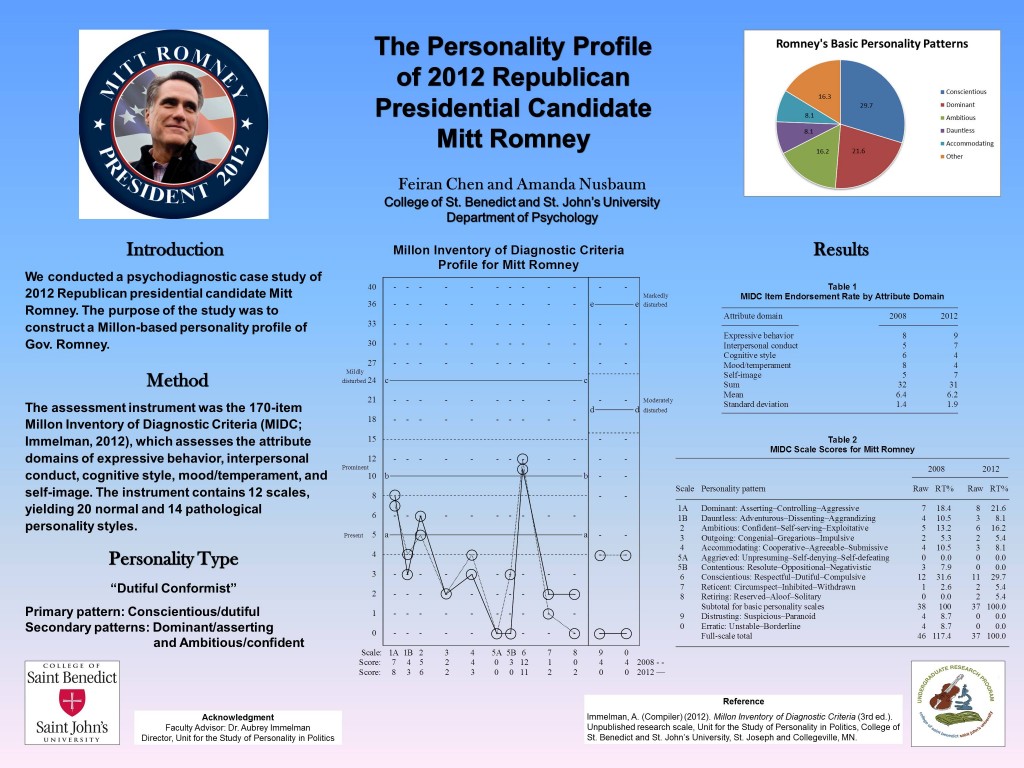
Click on image for larger view
Excerpt: A psychological analysis of former Massachusetts governor Mitt Romney– a contender for the Republican nomination in the 2012 presidential election — by Feiran Chen, Amanda Nusbaum, and Aubrey Immelman, Ph.D., at the Unit for the Study of Personality in Politics, revealed that Romney’s predominant personality pattern is Conscientious / dutiful, with secondary Dominant / asserting and Ambitious / confident features. In summary, Romney’s personality composite can be characterized as a dutiful conformist. The major implication of the study is that Romney lacks the personal appeal and political charisma, as measured by the Personal Electability Index for presidential contenders, to defeat President Barack Obama in the 2012 U.S. presidential election.

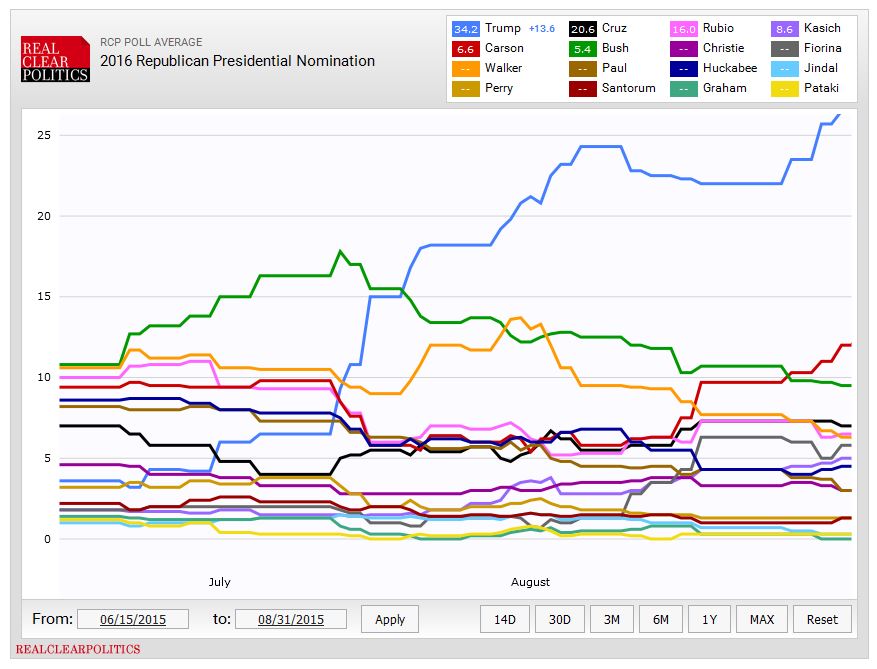
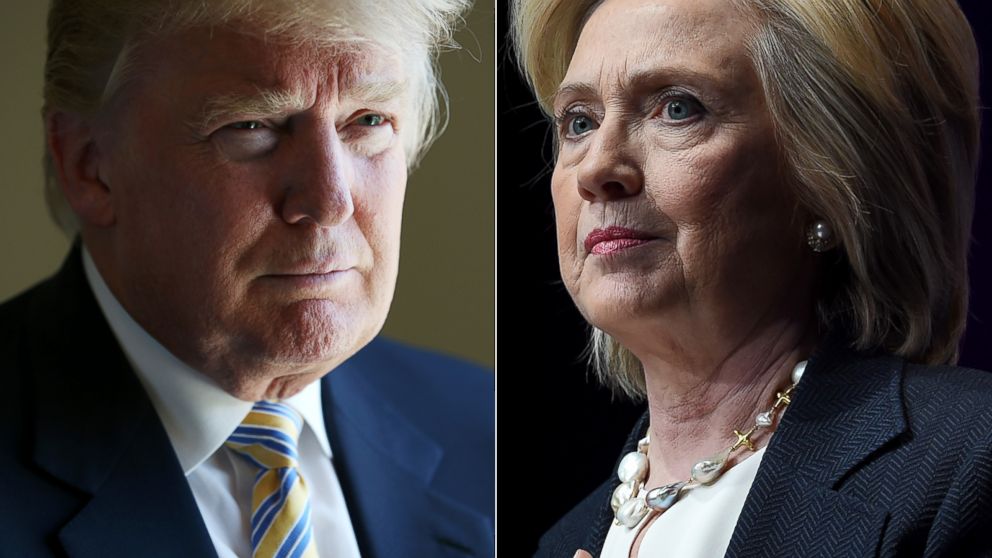









Follow Aubrey Immelman